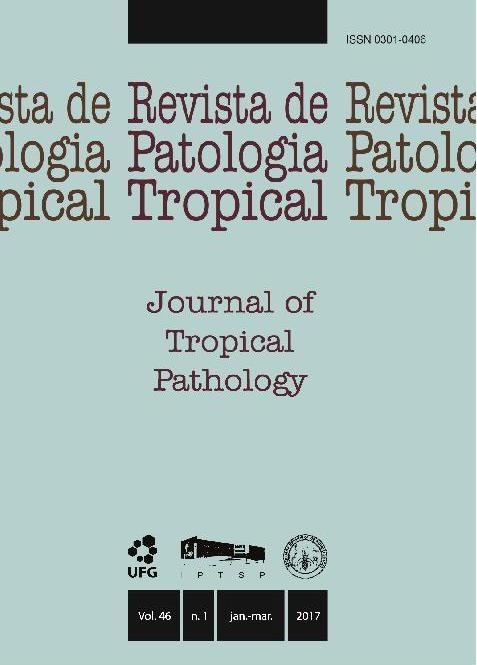PREVALENCE OF INTESTINAL PARASITES IN child day care centers: EPIDEMIOLOGICAL SIGNIFICANCE
DOI:
https://doi.org/10.5216/rpt.v46i1.46301Keywords:
Parasitic Diseases, child day care centers, health education.Abstract
Intestinal parasites are among the most commonly found pathogens in humans and are considered a public health problem. The frequency of intestinal parasites was evaluated in children and staff at two day care centers in the city of Ituiutaba, Brazil and health encouragement
activities were developed. For parasite detection in stool samples the Ritchie’s technique and the Hoffman-Pons-Janer, Baermann-Moraes, Willis and Ziehl-Neelsen methods were applied.
Of 140 children, 88 (62.9%) were positive, where Giardia intestinalis cysts were present in 65 children (51.1%), Entamoeba coli in 22 (17.3%), Endolimax nana in 12 (9.4%), Entamoeba histolytica/E. dispar in 9 (7%), Hymenolepis nana eggs were found in 5 (4%), hookworms in 4 (3.1%), Ascaris lumbricoides and Enterobius vermicularis in 3 (2.3%) and Strongyloides stercoralis, Trichuris trichiura, Cryptosporidium spp. and Iodamoeba butschlii in one child (0.8%). Among the 41 employees examined, 10 (24.3%) were positive, E. coli cysts were found in 6 samples (35.2%) and E. nana in 5 (29.4%), followed by E. histolytica/E. dispar
in 4 (23.6%) and G. intestinalis and E. vermicularis eggs in (5.9%). The data show the high frequency of intestinal parasites in fecal samples analyzed and demonstrate the importance of adopting preventive measures such as health and education involving the community.
Downloads
Downloads
Published
How to Cite
Issue
Section
License
The manuscript submission must be accompanied by a letter signed by all authors stating the full name and email address, confirming that the material has not been published or is under consideration for publication elsewhere, and agreeing to transfer copyright in all media and formats for Journal of Tropical Pathology. The authors will not be paid for published articles. They are solely responsible for the content of those articles, even if the Editor holds the right to adjust them to the norms of the journal.
The reviewers will not be paid for the peer review process.

